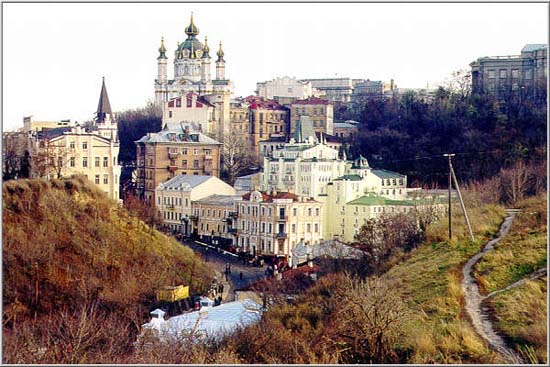
Matt Hagengruber says "since coming to Ukraine in March as a Peace Corps volunteer, my culinary palate has been wiped clean and replaced with something entirely different"
Taste of life in Ukraine: It goes down smooth as a traditional lard sandwich
By Matt Hagengruber
Special to The Seattle Times
Since coming to Ukraine in March as a Peace Corps volunteer, my culinary palate has been wiped clean and replaced with something entirely different.
I've eaten raw fish, boiled fish head, raw pig fat, squid jerky, pickled everything and an odd assortment of mystery meat, usually doused with ketchup. Pizza usually includes corn and shredded, pickled carrots, and hot dogs are covered with cabbage and mayonnaise. But I enjoy it, as do my Ukrainian hosts, who revel in getting the American to blindly eat whatever comes out of the cloudy, salty bowl of fish stew.
And then eat it the next morning, cold, for breakfast.
But possibly my biggest challenge, and my biggest insight into Ukrainian culture, came at a Sunday afternoon picnic along the Uzh River in western Ukraine. I live in the city of Uzhgorod, in a flat pocket between ridges of the Carpathian Mountains.
My host family and I left the city behind in their Lada sedan, which still runs despite being nearly 30 years old. We met up with friends in a field crowded with other picnickers. I had no idea what I was in for.
We built a quick fire and settled in as my host mom, Maria, peeled small potatoes with a knife. They were about the size of golf balls and are currently selling for next to nothing at the local market. In summer, fresh local vegetables are as cheap as the chocolate-colored dirt they come from.
Maria split the potatoes in half like a hamburger bun and sprinkled each flat side with a mix of peppers and Hungarian spices. Hungary is just across the border, less than an hour away.
After the spices came the wedge of salo, sandwiched between the two potato halves. The best way to describe salo is to think of a hunk of bacon the size of a small suitcase, minus the meat, with only the white, stringy fat left behind.
The raw pig fat is bought cheap in the bazaar, and a sharp knife slices through it like, well, lard. My family has a 10-pound slab hanging from a meat hook in its pantry, next to homemade sausage and jars of strawberry jam.
Salo is a Ukrainian tradition that dates back centuries. It's usually eaten raw, a few slippery slabs atop a piece of sour brown bread. It goes well with a shot of peppered vodka, one taste canceling the other. But this was different. This was a full-blown Ukrainian salo fest.
The salo-potato sandwiches were wrapped in foil and dumped on the smoldering fire, as were 15 plain potatoes, which sat right in the coals until they had fully blackened an hour later.
Yura, a longtime friend of Ivan, my host dad, pulled out a well-used cast-iron frying pan and filled it with the remaining salo and half a dozen sliced onions. Within a few minutes, the salo had liquefied and engulfed the onions, which crackled and sizzled in the pan. The tough bacon skin that remained turned brown and curled up like a pork rind.
Yura took a handful of branches from a Russian olive tree and whacked the blackened skin of the potatoes until the ash had fallen off, leaving behind only the gold-colored meat. He split the potatoes in half with his hand and dumped them and the onion and salo mix into a pot, which he tossed like a salad.
At first, the idea of eating salo — pure fat — as a main course caused my appetite to shrivel, but I'd steeled myself prior to coming to Ukraine to take what I was offered, even if it meant a quart of pure fat over a pot of potatoes.
As with many of the delicacies I've been offered here, I ate everything with an outward smile.
We drank spring water and homemade wine, ate foot-long green onions and tore at thick slabs of rye bread. The families told stories about concerts they attended and the travel hassles that marred a recent trip to Kiev, some 400 miles to the east.
Despite the somewhat shocking tastes, this was the true experience I had come here for. I wouldn't trade it for all the things I miss in America.
We finished the day by climbing a hill to an ancient castle that overlooks the Uzh River valley. Looking west, over the Carpathians and into Slovakia, we watched the sky turn a deep blue and lightning strike the far-off hillsides.
The crumbling castle stood still and silent with us, watching over the valley and the approaching storm as it has done for centuries.
Matt Hagengruber is from Helena, Mont.
The Travel Essay runs each Sunday in The Seattle Times and also online at seattletimes.com. To submit an essay for consideration, make sure it's typed and no longer than 700 words. Essays, which are unpaid, may be edited for content and length. E-mail to travel@seattletimes.com or send to Travel, The Seattle Times, P.O. Box 70, Seattle, WA 98111. Because of the volume of submissions, individual replies are not always possible.

